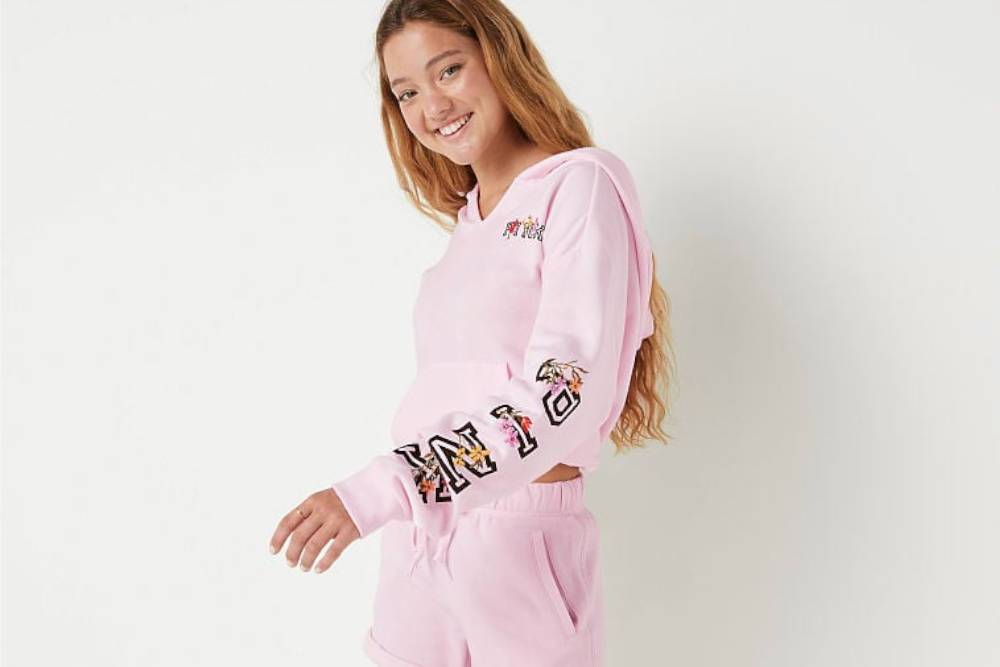
PINK is an American fashion retailer by Victoria's Secret and multinational clothing-retail company that makes casual apparel, sportswear, underwear, and accessories for women.
PINK also creates swimwear, sleepwear, footwear, eyewear, and beauty products. American lingerie company Victoria's Secret & Co. owns PINK, Victoria's Secret, and Happy Nation.
PINK operates more than 700 stores and has 78,000 employees in stores, factories, logistics, brands, and subsidiaries across 50 countries where it does business.
PINK believes in doing what is right in the industry, its community, and our world. It wants to support a healthier planet and work on reducing its environmental footprint.
PINK is a fashion brand and clothing retailer based in Reynoldsburg, Ohio, United States. It makes apparel, shoes, and accessories and offers a collection of basics, activewear, underwear, loungewear, swimwear, and sleepwear.
Panaprium is independent and reader supported. If you buy something through our link, we may earn a commission. If you can, please support us on a monthly basis. It takes less than a minute to set up, and you will be making a big impact every single month. Thank you!
Sustainability Rating: 5/10
Rating FAQ
Category: Clothing, accessories, shoes, bags
For: Women
Type: Basics, activewear, underwear, loungewear, swimwear, sleepwear, boots, sneakers, flats, sandals
Style: Casual
Quality: Medium
Prices: $$
Sizes: 2XS-2XL, 0-20 (US), 2-22 (UK), 32-52 (EU), 4-24 (AU)
Fabrics: Cotton, linen, lyocell, modal, viscose, cupro, polyester, nylon, spandex, polyethylene, acrylic, neoprene, polyurethane, rubber, leather, wool, silk
100% Organic: No
100% Vegan: No
Ethical & Fair: No
Recycling: Yes
Producing countries: Cambodia, China, India, Indonesia, Mexico, Sri Lanka, Thailand, Vietnam
Certifications: BCI, GRS, RWS, FSC, ZDHC, Oeko-tex
Sustainability Practices
PINK takes wide-ranging measures to protect biodiversity, reduce its consumption of water, energy, and other resources, avoid waste, and combat climate change.
It wants to be better and more efficient by looking at every aspect of its value chain to ensure the healthy functioning of our planet. However, the majority of its business remains detrimental to the environment.
PINK only uses a tiny proportion of organic materials such as organic cotton or recycled materials such as recycled polyester and regenerated nylon.
Most of the fabrics it uses are either natural without relevant certifications, such as regular cotton or linen, or synthetic petroleum-based fibers such as polyester, nylon, acrylic, and more.
PINK also uses a small proportion of semi-synthetic fibers or regenerated cellulosic fabrics such as Tencel lyocell, modal, acetate, and viscose.
Tencel is an eco-friendly fiber made with wood pulp from certified sustainable forests. But only a tiny proportion of the materials used by PINK are environmentally friendly and sustainable.
PINK publishes a list of all its manufacturers but not all its processing facilities on its corporate website. It aims to ensure responsible business practices and partners with suppliers and factories with an excellent compliance track record.
PINK used to employ sweatshops in Jordan, Bangladesh, and Sri Lanka, where workers were forced to work without being paid.
Many cases of child labor, sexual abuse, and physical assault were reported in cotton farms and garment factories working for PINK.
The company has also recently been involved in wage theft scandals in Thailand as it owed workers millions of dollars as a result of factory closures and unpaid wages and severance.
PINK cares more about its suppliers now with higher transparency and worker empowerment initiatives. But the brand still doesn't pay a living wage across its supply chain.
The 2022 Fashion Transparency Index gave PINK a score of only 18% based on how much the group discloses about its social and environmental policies, practices, and impacts.
PINK manufactures its clothes in many East Asian countries, where human rights and labor law violations happen every day.
The American clothing retailer doesn't show any labor certification standard that would ensure good working conditions, decent living wages, health, safety, and other crucial rights for workers in its supply chain.
PINK has a code of conduct that applies to all its suppliers and subcontractors based on the regulations set by the International Labor Organization (ILO).
PINK assesses compliance with its Code of Conduct by informal visits or third-party audits with or without notice. The brand makes some progress towards ensuring good work conditions. But it still doesn't audit all its factories.
PINK doesn't use exotic animal skin, hair, fur, or angora. But it uses leather, wool, and silk to manufacture many of its clothing pieces.
These animal-derived materials are cruel and unethical. They also harm the environment by producing greenhouse gases and waste. More sustainable alternatives exist.
Sustainability Goals
PINK has committed to working with other brands and supply chain partners on more sustainable manufacturing. It doesn't have any clear sustainability goals, science-based targets, or timelines to improve in the future.
Reviews And Experiences With PINK
Have you had (good) experiences with shopping at or the products of PINK? Then leave us your rating below.
What We're Up Against
Multinational corporations overproducing cheap products in the poorest countries.
Huge factories with sweatshop-like conditions underpaying workers.
Media conglomerates promoting unethical, unsustainable products.
Bad actors encouraging overconsumption through oblivious behavior.
- - - -
Thankfully, we've got our supporters, including you.
Panaprium is funded by readers like you who want to join us in our mission to make the world entirely sustainable.
If you can, please support us on a monthly basis. It takes less than a minute to set up, and you will be making a big impact every single month. Thank you.






























0 comments